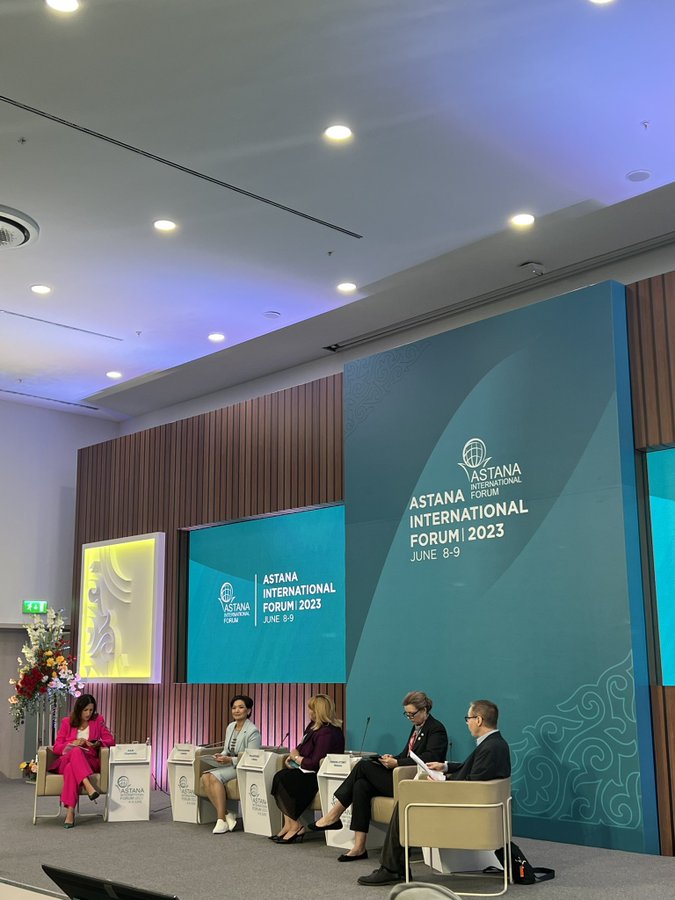ASTANA – Astana International Forum’s panel session, Advancing Women’s Leadership: Supporting International Global Initiatives, on June 9 considered the initiatives that should be taken to promote women’s leadership and political representation, and amplify their voices in senior decision-making roles, which is crucial to achieving gender equality and creating a world, which is fair, just and inclusive.

Experts joined the Advancing Women’s Leadership: Supporting International Global Initiatives panel at the AIF. Photo credit: The Astana Times.
Advancing women’s leadership can help to tap into the potential of half the world’s population and create a more equal and prosperous world for all, according to the speakers of the session.
Chairwoman of the National Commission on Women’s Affairs and Family and Demographic Policy under the President of Kazakhstan, Aida Balayeva, outlined the steps taken by the Kazakh government to promote gender equality and women’s empowerment, including through the adoption of progressive laws and policies and the implementation of programs aimed at improving the status of women in society.
“Kazakhstan has demonstrated its strong commitment to promoting gender equality and empowering women to participate in most initiatives and institutions in the world. Kazakhstan is one of the first Central Asian countries that established the National Commission on Women’s Rights and Family and Demographic Policy under the President, which is dedicated to advancing gender equality,” she said.

Michaela Friberg-Storey, UN Resident Coordinator for Kazakhstan. Photo credit: The Astana Times.
Balayeva also emphasized women’s entrepreneurship as one of the core directions to improve women’s leadership roles in the business sector.
“Today, more than 40% of businesses in the country are owned by women. One significant achievement is the establishment of 20 centers for women’s entrepreneurship development across all regions of Kazakhstan,” she said.
Liliana Palihovici, special representative of the Organization for Security and Cooperation in Europe (OECD) Chairperson-in-Office on Gender, stressed the important role of women in the decision-making process in all areas of life, including peace-building and negotiations. She called on women to be brave and be there where decisions are taken, as everything affects men and women equally.
“Women should not be intimidated, they should be active and ask for their place at the table, where decisions are taken. We may come to the point of equal representation of women and men when governmental institutions help us,” Palihovici said. “For this, we need political will and to operate more with politicians to enhance the legislation and support our initiatives.”
She also pointed out that the absence of women in the decision-making process inhibits the representation of their interests and does not reflect the right solutions to the issues that women are facing.
United Nations Resident Coordinator for Kazakhstan, Michaela Friberg-Storey, supported the idea that women should be more active in and around peace negotiations and the security field, as they can bring a tangible impact on peacekeeping environments, helping to protect women’s rights and support the role of women in building peace.
“If you have female peacekeepers, you will be more successful in your military operations because you will be able to meet with all of the population and be more reflective of the society that you come from,” she said. “No one should be afraid when there is a police officer or a military officer, we should all feel that these are service providers, just like doctors or teachers or anyone else.”
Friberg-Storey also focused on equality, the engagement of men in this area, and the recognition that women’s rights are human rights that should be discussed worldwide.
“Let’s not talk about gender equality and empowering women only in one session. Let’s make sure that we ask the question whenever we make policy decisions, all the time. I heard very clearly yesterday in the plenary session the commitment to gender equality not only from the President of Kazakhstan but also from the other speakers,” she said.
Friberg-Storey highlighted the importance of joint initiatives to combat sexual and gender-based violence, which is the key to unlocking many other issues related to women’s and girls’ empowerment.
Friberg-Storey said that it is difficult to talk about women’s empowerment and human rights as long as there are high rates of sexual and gender-based violence. The lack of understanding and the dismissiveness of these issues is a universal problem in development.
According to Robert Parker, trade team leader at the Economic Development Office of the United States Agency for International Development (USAID) Central Asia, initiatives and programs of any state should address the issues facing women, including lower salaries compared to men and low representation rates in leadership. The measures should also empower women to acquire business skills to do better in the workplace.
“It is important to realize that we are all working together in the same fight to achieve the same goals. I would like to mention some USAID programs launched in the Central Asia region aiming to create new opportunities for women. For example, the Digital Women Camp Program in Turkmenistan will empower women and girls by equipping them with coding skills, web development, mobile app development, and back-end development, so that they can find jobs and careers in the IT sector,” he said.
Parker pointed out that all the initiatives work to increase the number of women in leadership roles, provide women with the necessary skills and training to succeed in these roles and create an environment that supports and promotes women’s leadership.

